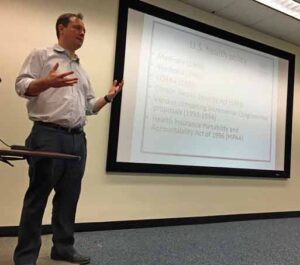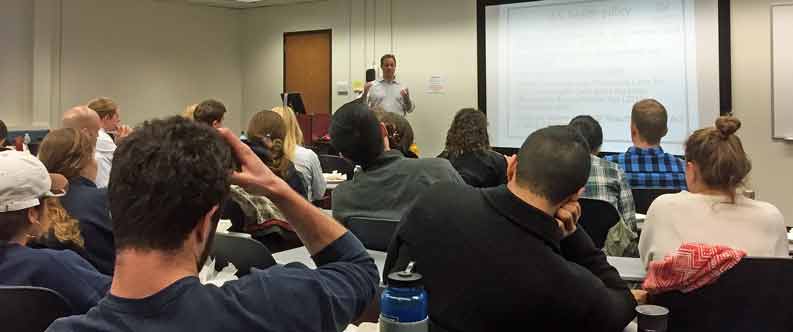
Interested in hearing the practitioner’s perspective on how healthcare economics and patient care might be impacted by the recent election? All are welcome to join the BRI-GWU chapter on Wednesday 12/7 at lunch to hear Dr. Jesse Pines, MD, MBA, an emergency physician who served as a Senior Advisor at the Center for Medicare and Medicaid Services.
Dr. Pines will discuss current healthcare innovations in the context of political and economic limitations, and how we as future physicians can navigate the changing healthcare landscape to best serve our patients.
Lunch will be provided! Please REGISTER to ensure enough food for all.
 Dr. Pines is the Director of the GW Center for Healthcare Innovation and Policy Research in the George Washington (GW) University School of Medicine & Health Sciences and a Professor of Health Policy and Management at GW Milken Institute School of Public Health (MISPH). Dr. Pines is the Principal Investigator for Urgent Matters (www.urgentmatters.org), a program that disseminates information on best practices in emergency care. Dr. Pines is a board-certified emergency physician practicing at GW Hospital with extensive experience in quality improvement, patient safety, operations research, and clinical epidemiology. Dr. Pines has served as a Senior Advisor at the Center for Medicare and Medicaid Services Innovation Center, and a consultant to the National Quality Forum on patient safety and emergency care. He co-authored an Institute of Medicine Report on sustainable models for emergency preparedness funding.
Dr. Pines is the Director of the GW Center for Healthcare Innovation and Policy Research in the George Washington (GW) University School of Medicine & Health Sciences and a Professor of Health Policy and Management at GW Milken Institute School of Public Health (MISPH). Dr. Pines is the Principal Investigator for Urgent Matters (www.urgentmatters.org), a program that disseminates information on best practices in emergency care. Dr. Pines is a board-certified emergency physician practicing at GW Hospital with extensive experience in quality improvement, patient safety, operations research, and clinical epidemiology. Dr. Pines has served as a Senior Advisor at the Center for Medicare and Medicaid Services Innovation Center, and a consultant to the National Quality Forum on patient safety and emergency care. He co-authored an Institute of Medicine Report on sustainable models for emergency preparedness funding.
Dr. Pines holds a B.A. in the Biological Basis of Behavior and a Masters of Science in Clinical Epidemiology from University of Pennsylvania and an MD and a Masters in Business Administration from Georgetown University. He completed a residency in emergency medicine at the University of Virginia Health Sciences Center and a fellowship in research at Penn. Prior to coming to GW in 2010, Dr. Pines served on the faculty at the University of Pennsylvania School of Medicine for 5 ½ years.

Dr. Pines has been awarded funding from multiple organizations including the Agency for Health Care Research and Quality, GW Hospital, Universal Health Services, Inc., the Robert Wood Johnson Foundation, the National Institutes of Health, the Department of Homeland Security, the Centers for Medicare and Medicaid Services, Emergency Medicine Foundation, American College of Emergency Physicians, American Geriatrics Society, the Institute on Aging, the Thomas McCabe fund, the University Research Foundation at Penn, the National Priorities Partnership on Aging, Boehringer-Ingelheim and Abbott Point-of-Care.
He is author on more than 200 peer-reviewed publications and has published several books: Visual Diagnosis in Emergency and Critical Care Medicine (2006, 2011), Evidence-Based Emergency Care: Diagnostic Testing and Clinical Decision Rules (2008, 2013), and Emergency Care and the Public’s Health (2014). His latest book, Value-Based Approaches in Acute and Emergency Care, will be published in 2016. He has contributed to TIME magazine, Slate.com, Emergency Physicians’ Monthly, Foreign Policy Magazine, and the Wall Street Journal.
POST-EVENT SUMMARY: Fifty medical students packed the meeting room to hear a practitioner perspective on what a Trump presidency could mean for healthcare. Dr. Pines, an emergency physician with extensive experience and knowledge of health policy, provided a brief history of health economics and health policy in the United States, with special attention to the years leading up the passing of the ACA. He then outlined possible scenarios that might take place in the next administration by breaking down each major Republican leader’s priorities for healthcare.
“Now more than ever, people need to understand health policy and how it is going to impact physicians.” -Katie S., MS2
In summary, relentlessly rising healthcare costs without comparable health outcomes led to the ACA. Some goals of the ACA were to expand coverage and to shift towards a value-based payment system with greater accountability for patient outcomes. With the passing of MACRA, there is a continued focus on merit-based payment for physicians and alternative payment models for hospitals. The ACA has been unpopular among many who see only a rise in cost sharing and overall healthcare spend.

The new policy agenda includes reforming Medicare and Medicaid, shifting more to private health insurance coverage and benefits, reducing healthcare costs, and changing quality metrics. Dr. Pines thinks it is unlikely that the ACA will be repealed in it’s entirety; whats more likely is that major parts of it will be completely defunded. While the Republican leaders agree on some things, they don’t agree on everything. Both Price and Ryan have strongly advocated for tax credits, HSAs, high risk pools, and sales across state lines. However, Ryan supports a continuous coverage requirement, while Trump and Price do not. Trump and Price also advocate for price transparency. The push for price transparency is growing, and that has the potential to radically change the healthcare system and the way we practice medicine. As it is, most physicians don’t know themselves how much things costs and don’t know how to respond to patients when they ask how much something is going to cost.
“Since the election, I have truly had no idea what to expect for healthcare other than the overly simplified ‘repeal and replace.’ The lecture gave me a much better sense of what to look for in the coming administration.” -MS1
Students of different political ideologies attended the event, and there was significant discussion during the Q&A about the choice of Tom Price as health secretary. Some students expressed concern about his priorities, while others thought him a choice who would represent physicians’ best interests. The lecture prompted numerous questions, both during the presentation and afterwards. There is a clear understanding that policy will impact future physician practice, and a strong desire to understand how.
“Given the fact that it is right before finals and winter break, I was expecting a much smaller turnout for this event. I was shocked by how many people came – first and second years who were days away from their exams, third and fourth years who came from their hospital rotations to attend. There were even numerous requests to have the event recorded. There was a clear interest in understanding more about the current policy positions of those about to take leadership and change law. And the event absolutely delivered. Dr. Pines very clearly outlined all of the major policy positions of Trump, Ryan, and Price, and he answered many questions throughout the event.” ~Caroline Jensen, BRI-GWU President
“A very informative talk.” – Leah F., MS2